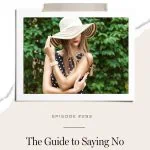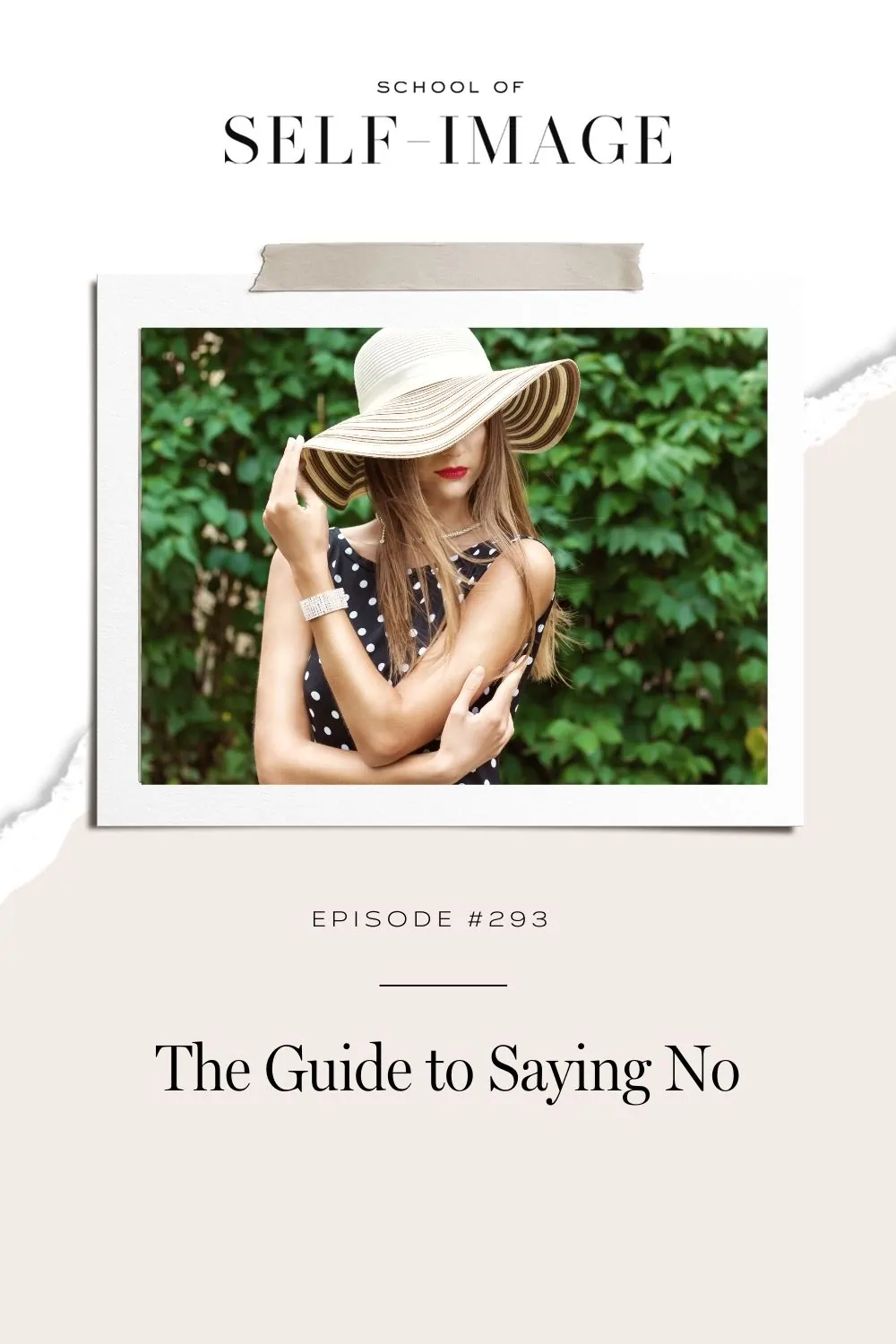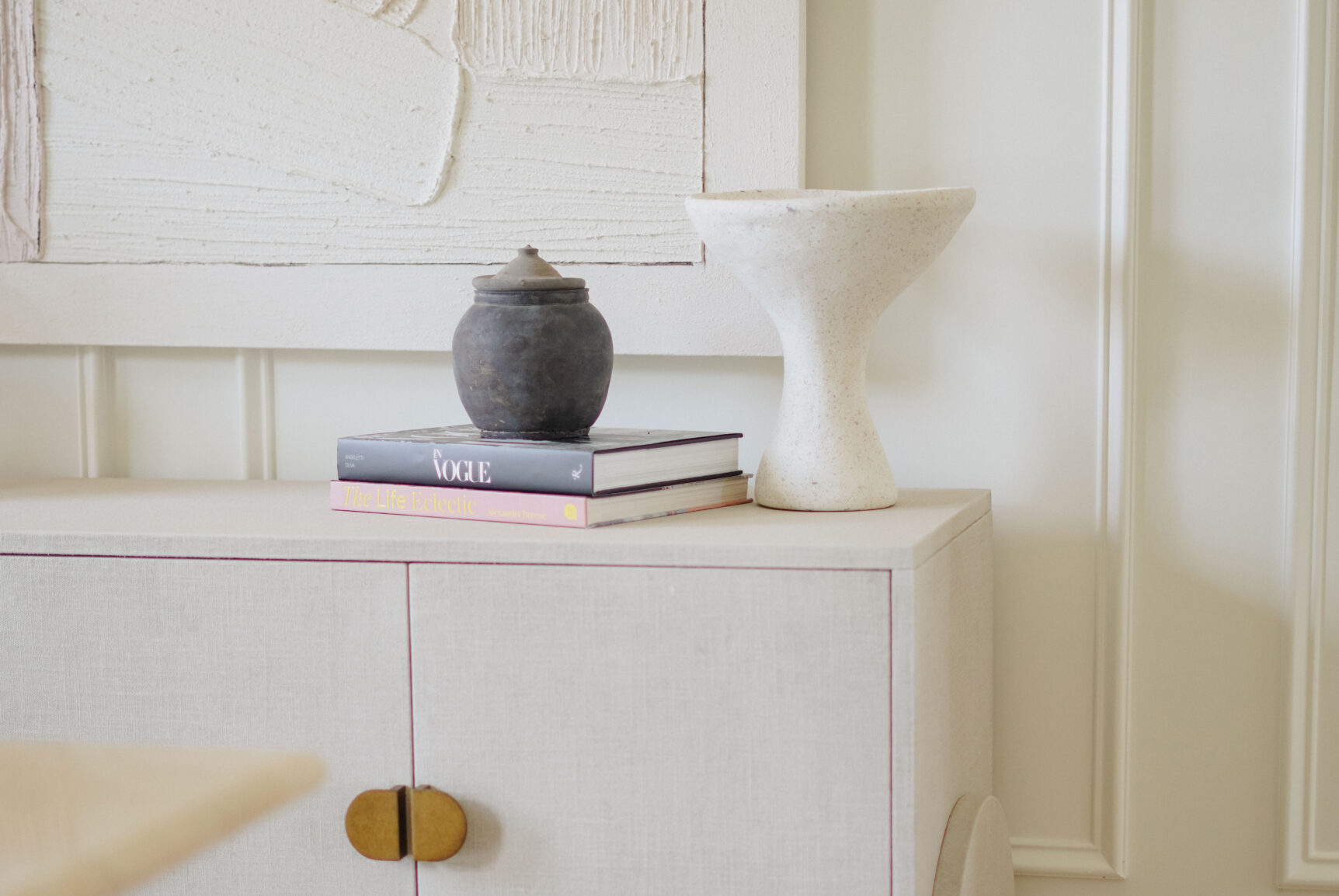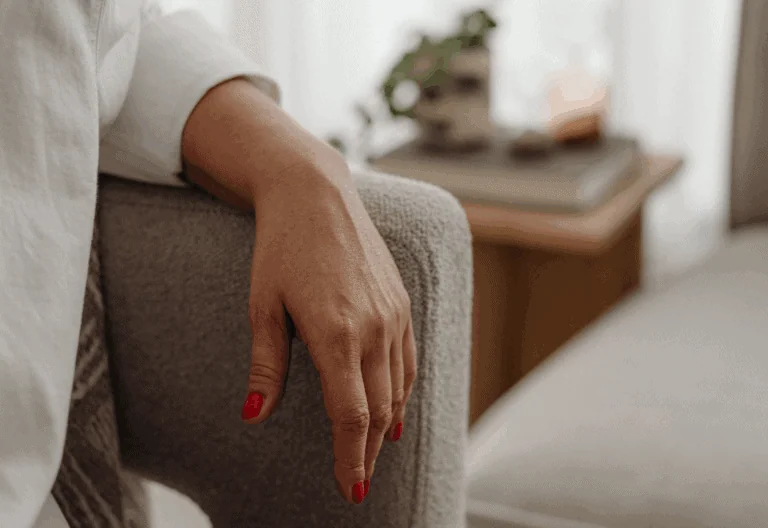
Do you have a hard time saying no? Well, welcome to the club. So many women struggle with saying no, so if this sounds familiar, I want you to tune in this week because I’m sharing something special with you: The Guide to Saying No.

Over here in my business, we’re going through a season of creativity and projects, and I’m getting a lot more requests than usual. This means I have to say no to some things, and as a recovering people pleaser, saying no isn’t always easy for me. But it’s been getting easier because I’ve been practicing saying no, and I invite you to do the same.
Tune in this week to discover why it’s so difficult to say no sometimes, and why saying yes when you don’t mean it isn’t the solution. I’m sharing my guide to saying no, doing it with honesty, grace, and integrity, and deciding what you do want instead.
Have you grabbed your free copy of the School of Self Image Manifesto? If not, what in the world? Click here to get your copy and learn how to think and show up in treas of mindset, style, and surroundings so that you can transform your self-image.
What You Will Discover:
- Why whatever you practice the most becomes more and more effortless in your life.
- How we’ve been overriding our intuition and our needs for so long.
- Why it’s easy to say yes, but easy doesn’t mean comfortable.
- The importance of being clear on what is essential for you.
- Why saying no is always an option for you, even if you’ve already said yes to something and you’re having second thoughts.
- The top 3 fears I see women have that stop them from saying no.
- My guide for saying no gracefully.
Featured on the Show:
- Download the Self-Image Manifesto and be the first to hear about amazing developments in our community!
- Learn more about The School of Self-Image and join today!
- Essentialism by Greg McKeown
- Love the show? Leave a review of the show in Apple Podcasts (click the link to find out how).
- Follow me on Instagram!
- Find me on Facebook!
Enjoy the Show?
- Don’t miss an episode, subscribe via iTunes, Stitcher or RSS.
- Leave us a review in iTunes.
The Self-Image Manifesto
You’re Invited To Live An Extraordinary Life!
Episode Transcript
Do you have a hard time saying no? Well, welcome to the club. And it’s exactly why I recorded this week’s podcast just for you. So, let’s dive into the guide to saying no.
Welcome to the School of Self-Image, where personal development meets style. Here’s your hostess, master life coach Tonya Leigh.
Hello, gorgeous friends. How are you feeling? I’m feeling a little bit of pressure. And I know it’s all in my head, so I’ve been working on my thoughts. But we are currently in a season of a lot of creativity and projects. And I’m getting more requests than usual.
And so, this has required that I say no a lot. More than usual. And as a recovering people pleaser, saying no isn’t always easy for me. But it’s getting easier. Why? Because I have been practicing it more and more in my life. And whatever you practice the most is what you’re getting good at. Whatever you practice the most is what’s becoming easier in your life.
And this explains why it’s so hard for so many people to say no because we’ve practiced overriding our own intuition and our own needs for so long and saying yes to many requests, that that’s become easy. But easy doesn’t always mean comfortable.
In the moment, it might be more comfortable to say yes because you don’t have to face the discomfort of being a new version of yourself. But there is a long-term payoff for that behavior.
Years ago, I read a book by Greg McKeown called Essentialism. That really got me on the path that I’m on today of being really clear about what is essential for me and having the courage and the compassion in my communication to say no to people more often.
And even now, sometimes I find myself saying yes in the moment, and then coming home and feeling sort of gross about it. But what I’ve been doing in those moments is immediately correcting it and being honest, calling that person up and saying, “Hey, listen, I know I committed to this, but I came home, and I’ve been sitting with it, and it just doesn’t feel right.”
So, my practice these days is making faster corrections when I find myself out of alignment and committing to being a woman of integrity. And that is a practice, you all.
So, I thought what would be useful is for me to share with you my guide to saying no gracefully. This is a question that I get asked a lot and I know that many of us struggle with saying no.
So, the first thing we have to think about is why is it so hard to say no? We have a lot of fear around a two-letter word. And I’ve identified the top three fears to saying no.
So, fear number one is the fear of how people will react, “They’re going to be upset with me.” How many of you are saying yes because you are afraid of someone being upset with you? And think about that. What ends up happening? You end up being upset with yourself. But this is what we do. And the truth is, they may be upset. And so, the practice is you being okay with other people being upset for you honoring what you need.
Isn’t it crazy how we interact with each other? It’s like, “Hey, you do this to make me happy. You give up your needs and what you want in order to make me happy.” And people are doing this with each other all of the time, versus everybody being accountable to their own happiness.
But it gets us into trouble when we are doing that pattern with other people because we end up saying yes, when what we really want to do is say no. And so, I can’t guarantee you that people won’t be upset when you say no. In fact, when you begin to change and show up in a more powerful way, people are going to be intimidated. They’re not going to like it. There will be some people that may be upset.
Can you hold the discomfort of that in your body? Because eventually, it will become less and less uncomfortable. It will become more uncomfortable for you to not honor yourself. So, that’s the first fear, how people will react.
The second fear is what people will think, “She’s so selfish. She only thinks about herself. She’s so rude. She’s so inconsiderate.” And here’s the truth, you all. They may say that. People get to think whatever they want. And most of us live our lives trying to show up in such a way to manage how other people think.
What if you just manage what’s going on in your brain and let people think whatever they want to think? I love what Greg McKeown says in his book. He said, “Essentialists accept they cannot be popular with everyone all of the time.” And because they’ve accepted that, they’re able to show up with integrity and honor what is a true yes for them and what is a true no.
And the final fear I’ve identified – and I’ve definitely struggled with this one. And that is the fear of missing out, FOMO. We say yes a lot to things because we’re afraid of missing out on that opportunity or that experience. But I have been practicing what I call JOMO, the joy of missing out.
This is when you train your brain to look for, “What is great about missing out on this? What is this going to allow me to do? What is this going to allow me to experience?”
And your brain is always seeking to answer whatever question you ask. So, if you ask the brain, “Hey, what am I missing out on?” It’s going to be giving you many, many things that it thinks you’re missing out on.
You’re missing out on meeting that person or you’re missing out on the good time that they’re probably going to have. This is what our brain does. But if you ask your brain, “What is the joy of missing out on this?” the brain’s going to say, “Well, you get to stay at home and rest and relax. You’re going to feel better. You’re going to wake up tomorrow energized.”
I had this happen to me last week. Fonz wanted to go out. He had heard that there were some people at this place that we go to a lot, people we actually enjoy hanging out with. It’s always a good time.
And when I checked in with my body, it was clear that I did not want to go. But I had that moment of, “Oh, but what am I going to miss out on?” And I immediately reminded myself of what I was going to gain by saying no.
I looked at my next week. I had a full week and I said, “You know what? I want to feel rested. I want to feel good. I don’t want to be out until one or two o’clock in the morning.” And so, I said no, and I embraced the JOMO of that decision.
So, those are the three fears that I’ve identified to saying no. So, let’s talk about why it’s important for you to say no.
The first thing is you’re able to focus on what’s most important to you. When you look at your calendar, when you look at how you spend your time every single day, does it align with your values? Does it align with your goals? Does it align with the woman you want to become?
When you pack your life with a lot of false yesses, meaning they’re not true to you, you’re not leaving the space for what is true for you.
The other reason why it’s important to say no is that it allows you to build a strong relationship with yourself. Oftentimes, we’re so busy pleasing everybody else and trying to build relationships with other people that we lose the relationship with ourselves.
We don’t feel good. We feel burdened. We get upset with ourselves because we’re not being honest. So, when you start to practice the art of saying no, you’re saying yes to you. And it feels good when you’re in relationship with someone and they’re saying yes to you. Well, we get to do that for ourselves. And I think that’s probably the most important reason.
But the other reason why it’s important to say no is it’s part of your self-care. You’ll have more energy because you’ll be saying yes to the things that are most important to you, and you’ll have better mental health because you know you’re not living a life of lies, which to me, that is what saying yes to something when you don’t want to say yes, that’s what it is. It’s a lie. You’re not being honest with yourself or the other person.
So, when should you say no? And the first way to know if you should say no is it just doesn’t feel right. Now, I need to make a very important distinction here. When I say it doesn’t feel right, it’s like intuition. It’s like a gut response. It’s something that you just know you really don’t want to do, and you would be happy in not doing it.
This is very different than the feeling of discomfort when you are going after goals that are exciting and important to you. Here’s how you will know the difference.
When you are going after something that is super important to you, but you encounter an opportunity that will allow you to get closer to that goal, your immediate response will be to say no.
And you may think, “Well, Tonya said, if it doesn’t feel right, say no.” No, no, no, no, that’s not what I’m talking about. On the other hand, when it doesn’t feel right, it’s going to be a lot harder to say no because, chances are, the only reason why you would say yes is to people please.
The other reason to say no is when you’re feeling guilty or feeling obligated. And this is why it’s so important that we check in with how we are feeling before taking the action. Because if you don’t deal with what’s creating the guilt and the feeling of obligation, you’re going to continue to stay in a pattern of saying yes to things that you want to say no to.
And guilt is simply an emotion being created by thoughts in your brain. And so, work on the guilt. Work on that feeling of obligation first and then decide, do I really want to do this thing?
Another reason to say no is if the request is asking you to cross a personal boundary. So, for example, let’s just say you’re in the car and a friend gets in a lights up a cigarette and you have a boundary that no one smokes in my car.
Now, you want this friend to like you. You want this friend to think you’re a cool person. And this is often when we’re like, “Yeah, it’s okay,” when actually it’s not. It’s a boundary of ours. And you should definitely say no when something or someone is crossing your personal boundary.
The other reason to say no is if you’re wanting to say yes only to people please. That is never a reason to say yes. It is always a reason to say no.
And then finally, a reason to say no is when you don’t have the capacity. The times I have said yes to things when I knew good and well that I didn’t have the capacity, and then I stressed myself out, and then I missed deadlines, and then I end up disappointing people, which is the reason why I was saying yes in the first place. I didn’t want to disappoint.
And so, I ended up creating the fear that I had all along instead of just being honest and saying, “No thank you. I don’t have the capacity for that right now.” So, let me give you some questions to filter requests through in order for you to decide if it’s a yes or a no.
The first thing I like to ask myself is, do I really want to do this? And to be honest with myself. Now, if my answer is no and I choose to do it anyway, I’m honest with myself about why I’m choosing to do this.
So, an example of that could be, let’s just say that when Fonz wanted to go out the other night and I said no, had I been honest with myself and said, “No, I don’t really want to go, however I’m going to go because it’s important to him and I’m willing to sacrifice sometimes for what he really wants to do.”
Because relationships are about give and take. Just that night, I wasn’t willing to give. I wanted to stay home. But it’s important because I think sometimes we believe, if we’re honest with ourselves, then we have to follow through on that honesty. And that’s not true.
I just think you’re always truthful with yourself about what you’re doing. So, do I really want to do this?
And then another question that’s really helpful for me is, if I say yes to this, what am I saying no to? So, if I say yes to this request, what am I giving up? And equally, I like to ask myself, if I say no to this, what am I saying yes to?
I always love to check in and ask myself, am I saying yes just to please someone? Will this take away from what’s really important in this season of my life? Will this add value to my life?
Now, sometimes with requests, there’s a middle ground. Maybe someone has asked you to do something and part of you is a yes, but how they’ve requested it, what they’re asking from you is a no. And so, that’s when you can say, “Hey, listen, I am willing to do this if…” and you change the terms of agreement. And then it feels really good to you.
So, finally, I want to talk about how to say no. I get this question a lot, “How do you tell someone no gracefully?” And I’m going to tell you very simply how to do it. you do not overexplain and you are direct.
This means that you don’t apologize, and you don’t offer all of the excuses as to why you can’t do something. Because people are always going to try to get you to a yes. That’s just the way we’re wired. I do this. When my friends tell me they can’t do something, I’m like, “Yeah you can. Let’s figure it out.”
So, you have to just be direct. Because if you say, “You know what? I really want to go to that party, but I don’t have anyone to watch the kids.” If that person really wants you to go to the party, then they’re going to be like, ‘Well, I’m going to hire a sitter to watch the kids for you,” when the truth is you didn’t want to go to the party and you just used your kids as an excuse.
So, I have found it’s always best to just be honest and to be direct and to never overexplain yourself. So, for example, you could say, “Thank you so much for thinking of me. But I can’t. I appreciate you inviting me, but my calendar is booked. I appreciate you thinking of me, but it’s just not a good fit. Thank you for that offer, but it doesn’t align with what I’m focused on right now. That sounds fun, but I have another commitment. I’m not comfortable with that request.”
Now, sometimes in the moment, you don’t know yet if it is a yes or a no. You need time to think about it. So instead of reacting and immediately saying no or yes, take a moment. Take as much time as you need. And it may be that you say, “Hey, listen, I need to think on this and get back to you later. I’d love to help you, but I need to look at my calendar and see if I can make it happen.”
But the secret here is to be honest. One of the things that I used to do because I thought it was being graceful is I would say, “I’d love to, but I can’t.” And the truth was, I didn’t love it. It wasn’t something that I loved. I was lying. Even though I was saying no, and I was honoring that, I was still trying to protect people’s feelings versus juts being like, “No, it just doesn’t feel right for me right now.”
So, we have to be onto ourselves. We have to be onto our little mind tricks that happen to all of us when we’re lying to ourselves and to other people. And it doesn’t mean we’re bad people. In fact, we’re really amazing people that just want people to be happy and we want to protect people.
But we often don’t protect ourselves in the process. So, if you’re struggling with saying no or how to say no, just practice it. And a simple, “No thank you,” always works as well.
Have a gorgeous week, everyone. And I will see you in next week’s episode. Cheers.
Hey, have you grabbed your free copy of the School of Self-Image Manifesto? If not, what in the world? Head over to sosistaging.wpenginepowered.com/manifesto and get a copy that teaches you how to think and show up in the areas of mindset, style, and surroundings so that you can transform your self-image.




